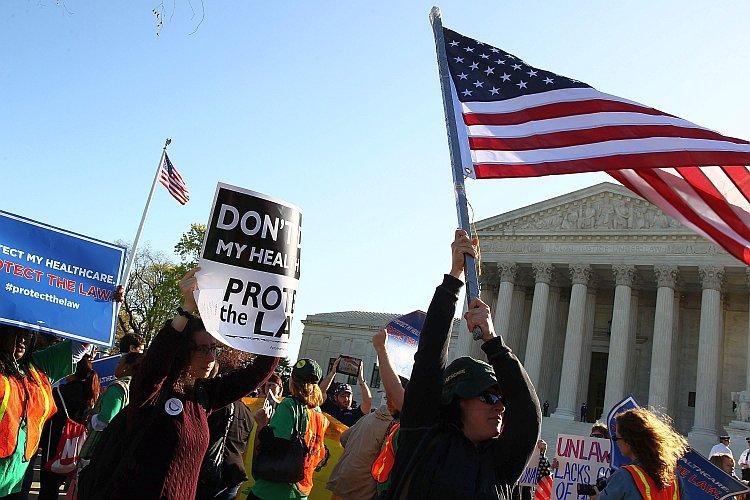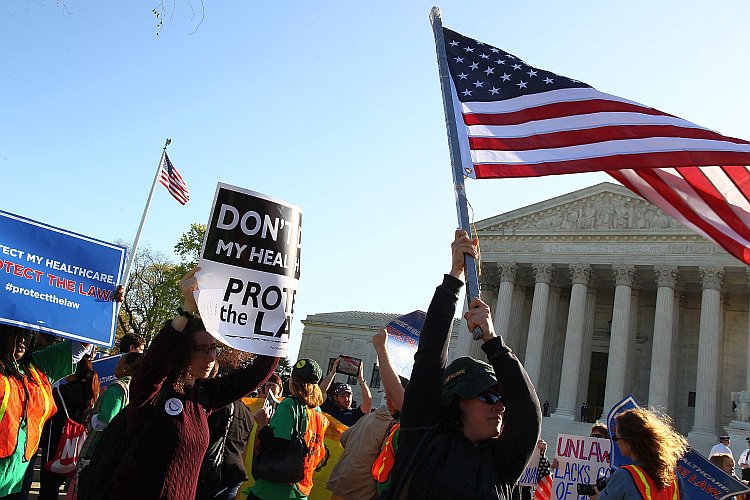WASHINGTON—The Supreme Court is finally hearing oral arguments on President Barack Obama’s health care reform legislation. The decision by the Court for the Patient Protection and Affordable Care Act, or simply the “Affordable Care Act” (ACA), is likely to set off a storm whichever way it comes down.
The Court scheduled three days of hearings on March 26–28. It is expected to hand down a decision in June. More than 100 friends of the Court briefs have been filed for this case.
The Supreme Court decision will affect 30 million uninsured Americans and likely impact the national elections of 2012. It could become the main issue that determines who occupies the White House and the party that controls Congress. Recognizing the importance of their decision, the Court set aside 6 hours for discussion, which it hasn’t done since 1966.
At stake is whether the United States will remain “the only rich country without universal health care,” writes Adam Liptak, The New York Times, March 11. The health care reform has been compared to Medicare and Social Security by Obama’s aides, said Liptak, while Republican leaders fear it moves the country “dangerously close to European-style big government.”
Individual Mandate
The provision in the law getting the most attention is the requirement that nearly everyone has health insurance coverage beginning in 2014, or pays a penalty. Known as the “individual mandate,” the minimum essential coverage provision of the ACA may be the best known, but is not the first or the only provision that the Court has agreed to decide.
The U.S. Supreme Court debated on March 27 for two hours whether Congress can require virtually everyone to have health insurance or pay a penalty. Called the “individual mandate,” polls show that it is the most disliked provision in President Obama’s health reform act, commonly called the Affordable Care Act (ACA).
By their questions, comments, and tone of voice, the four liberal justices, Justices Stephen G. Breyer, Ruth Bader Ginsburg, Elena Kagan, and Sonia Sotomayor, favored the mandate, but are one short of a majority. The liberal justices will probably have to persuade a skeptical Justice Anthony Kennedy to the constitutionality of the law. Chief Justice John Roberts left a crack open that he might support the mandate.
Two of the other conservative justices, Antonin Scalia and Samuel Alito, seemed very hostile and skeptical to this provision in the ACA. Justice Clarence Thomas did not speak, but he is reputed to oppose broad powers of Congress to regulate.
Solicitor General Donald B. Verrilli made the case for the government side. He began by saying that for 80 percent of Americans, the insurance system works well.
“But for more than 40 million Americans who do not have access to health insurance either through their employer or through government programs such as Medicare or Medicaid, the system does not work. Those individuals must resort to the individual market, and that market does not provide affordable health insurance.”
Verrilli said that Congress needed to design a health system that met the legal requirements for employer and government insurance, such as precluding discrimination based on pre-existing conditions, offering to all regardless of health status or age, sex, etc., and that it meet minimum coverage. To pay for the above, the ACA requires virtually everyone be in the insurance pool.
Justice Anthony Kennedy seemed skeptical and interrupted with: “Can you create commerce in order to regulate it?”
“What is being regulated is the method of financing health, the purchase of health care. That itself is economic activity with substantial effects on interstate commerce,” replied Verrilli.
Verrilli explained that “virtually everybody else is either in that market or will be in that market,” because everyone at some time in their life is going to need medical care. Eighty-three percent visit a physician every year; 96 percent over a five-year period, he said.
Justice Scalia said, “The Federal Government is not supposed to be a government that has all powers; that it’s supposed to be a government of limited powers. … If the government can do this, what, what else can it not do?”
Justice Kennedy dropped a bomb with this question for Verrilli: “When you are changing the relation of the individual to the government in this, what we can stipulate is, I think, a unique way, do you not have a heavy burden of justification to show authorization under the Constitution?”
Kennedy’s words, “Changing the relationship of the individual to the government” indicate that he is seeing the mandate in a fundamentally different way from other legislation.
Later Justice Kennedy asked, “Can you identify for us some limits on the Commerce Clause?”
Medicaid Expansion
“The Medicaid expansion issue is the real sleeper issue of the health-care challenge,” says Elizabeth Wydra, chief counsel for the Washington-based Constitutional Accountability Center, who represents state lawmakers supporting the health-care law.
The ACA will increase the number of persons enrolled in state Medicaid programs by allowing enrollment in year 2014 by all persons under 65 with incomes up to 133 percent of the federal poverty level (FPL), i.e., $14,856 for an individual and $30,656 for a family of four (based on the 2012 federal poverty level), according to the government’s Centers for Medicare and Medicaid Services. This provision will increase the number on Medicaid by an estimated 16 million, according to the Alliance for Health Reform.
Dr. Glenn Cohen explained in The New England Journal of Medicine that Medicaid had not previously set a baseline income level for mandatory eligibility for adults. When fully phased in (in 2020), the ACA will provide 90 percent federal matching funds for the new beneficiaries, and 100 percent initially. While this may seem very generous, Cohen says Florida will likely argue that “even a 10 percent copayment overly stretches state budgets.”
Court watchers were surprised that the Supreme Court agreed to consider the Medicaid expansion; the Court has never struck down any federal spending program. Only the lawsuit brought by Florida, joined by 25 other states, challenged the Medicaid expansion, and no lower court overturned it.
But the fact that the Court set aside an hour to hear the case signaled the Court takes this issue seriously.
The opponents of the ACA say that the Medicaid expansion uses “coercion” by Congress in making the receipt of federal funds for a federal program conditional to states outlaying funding that is an unfair burden for them. Although states don’t have to participate in Medicaid, as a practical matter, states heavily rely on federal matching money to pay for medical care of the poorest citizens.
Former attorney general of the state of Florida Bill McCollum, who filed the challenge to the ACA, a suit eventually joined by 25 other state attorneys general, said that the single biggest item in many state budgets is often Medicaid. “Florida’s Medicaid program consumes more than a quarter of the State’s financial outlays” in a budget that is already strained, McCollum said in the news release when Florida challenged the law moments after President Obama signed it on March 23, 2010.
Lyle Denniston, legal journalist, who has reported on the Supreme Court for 52 years, said at the National Press Club forum, “Many people in the social welfare community [believe this] is really the most important issue in this case because aside from Medicare and Medicaid and Social Security, if the coercion argument is found to prevail … you can kiss goodbye to the idea that there is a social safety net that the federal government can impose or inaugurate. That is a really big issue.”






